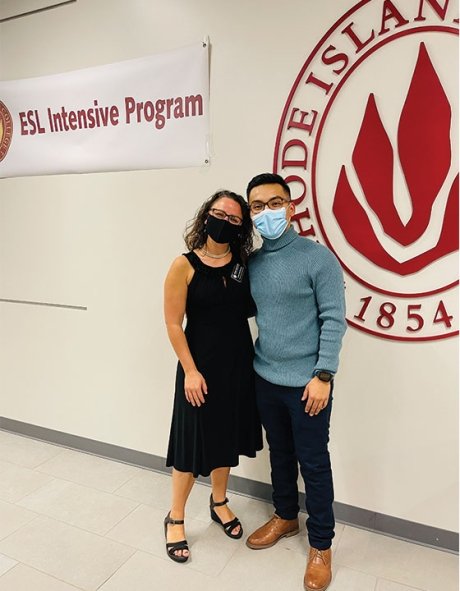International Student Navigates a Path from ESL to Nursing School
- News & Events
- News
- International Student Navigates a Path from ESL to Nursing School

Bryan Soto found the supports necessary to achieve his dream at Rhode Island College.
“When I finished high school in Guatemala I didn't see any opportunities. I felt like I didn't see a future where I could move forward,” says Bryan Soto, a 23-year-old first-generation student at Rhode Island College.
His passion for education and his search for better opportunities for his life brought him to Rhode Island. “In my country it’s too expensive to go to college. Although I applied, I was not accepted because I didn’t have the necessary resources or the money,” he says.
Soto arrived here five years ago, looking for the kind of opportunities that were denied to him in his native land. He knew it would not be an easy task. First of all, he could not apply for college right away, because he needed at least three years living here to be eligible for in-state-tuition. While the time came, he started with the basics. “I felt like I didn’t understand much English, so I decided to take the ESL Intensive Program at RIC. I did three levels and took summer classes,” he explains.
The ESL Intensive program, which allows students to earn credits while building their language skills, put Soto on track to matriculate in a degree program. Now in his fourth semester, he’s taking some basic classes and working his way up to majoring in nursing. “Thank God I found these opportunities. I am studying something that I like and I hope to be able to graduate with high honors,” he says. His goal is to be accepted into the nursing program by the fall of 2023.
Despite the support the ESL Intensive program provided, Soto still had much work to do to start moving towards achieving his dream. “All the processes [of applying to college] were in English, so, to be honest, at some point I felt like I didn’t understand anything,” he recalls. “I needed to write an essay about my life and why I wanted to enroll at RIC. I was not sure of what I was writing; it felt like I could not connect paragraphs properly.”
Thanks to a friend who was already a RIC student, he was able to understand the process better and work on what he needed to do to enroll. Meanwhile, Laura Faria-Tancinco, the coordinator of the ESL Intensive Program, became his support. “She has been a great help with any questions about documentation or applications, even about my classes; she has always been there to support me.” He adds, “I have so much to thank her for. I feel like I have improved and now I understand 75 percent of the language.”
Taking classes entirely in English have been tough for him, but Soto has managed to keep working as hard as he can. “Biology is like talking another language; the words are hard to pronounce. When I have to read I don’t understand anything,” he admits. “Luckily I found someone to help me study for that class. My last quiz was much better than the previous one, which means I am improving.”
Soto praises not only the ESL program, but the office of Learning for Life (L4L) – which helps students facing obstacles to graduation with tuition, technology, books or other needs – for being involved with his process, giving him the tools to navigate the system, to find scholarships that could help him pay for school.
Thanks to L4L, Soto learned that international students like him, who are not eligible for FAFSA aid, may be eligible for other benefits. In his first year, he received both state aid and support from American Rescue Plan funds. Going into this year, he notes, “I have been awarded two scholarships and now I feel ready; I could be the living proof for international students that we have organizations and resources at RIC to help fulfill our dreams.”
Now firmly on the path to earning his degree, Soto feels that perseverance and discipline have played huge roles in how far he has come. He is confident that at the end, all his hard work will pay off. “As we say in my country, we must be curious to ask and contact more people to find out what help they can offer us.” He concludes, “In five years, I see myself registered as a nurse in a hospital and being an interpreter to help those in my Hispanic community.”
